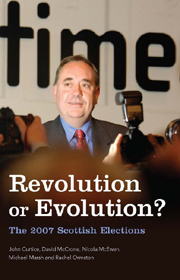Book contents
- Frontmatter
- Contents
- List of Tables
- Preface
- CHAPTER 1 A Watershed Election?
- CHAPTER 2 A Distinctive Scottish Voice? Identities, Values and Attitudes
- CHAPTER 3 What has Devolution Achieved? The Public's View
- CHAPTER 4 Governing Scotland: The People's Preferences?
- CHAPTER 5 Lost Labour Votes? Records, Personalities and Issues
- CHAPTER 6 How the SNP Won
- CHAPTER 7 Do Voters Care about Parties Any More?
- CHAPTER 8 A Personal Vote? How Voters Used the STV Ballot
- CHAPTER 9 Conclusion
- Technical Appendix
- Index
CHAPTER 5 - Lost Labour Votes? Records, Personalities and Issues
Published online by Cambridge University Press: 12 September 2012
- Frontmatter
- Contents
- List of Tables
- Preface
- CHAPTER 1 A Watershed Election?
- CHAPTER 2 A Distinctive Scottish Voice? Identities, Values and Attitudes
- CHAPTER 3 What has Devolution Achieved? The Public's View
- CHAPTER 4 Governing Scotland: The People's Preferences?
- CHAPTER 5 Lost Labour Votes? Records, Personalities and Issues
- CHAPTER 6 How the SNP Won
- CHAPTER 7 Do Voters Care about Parties Any More?
- CHAPTER 8 A Personal Vote? How Voters Used the STV Ballot
- CHAPTER 9 Conclusion
- Technical Appendix
- Index
Summary
So far we have looked at the climate of opinion in which the 2007 Scottish parliamentary election was fought. We have uncovered little evidence to support some of the more obvious and immediate explanations of the SNP's success. People in Scotland were no more likely than before to regard themselves as Scottish rather than British. Scotland had not grown apart from England in its values and attitudes. Devolution may have brought its disappointments, but it is not clear that dissatisfaction with its performance had increased over recent years. And, above all, it is not apparent that support for independence had grown.
But of course in focusing on people's sense of national identity, their values and their constitutional preferences, we are making an important assumption – that these are the things that actually make a difference to the way that people vote. Politicians might talk about the respective merits of independence and devolution, but it does not follow that people decide how to vote on the basis of their view of that debate. Parties may invoke the symbols of Scottish or British national identity, but perhaps they are mistaken in believing that such symbols actually resonate in voters' hearts and minds. So in this second part of the book we look directly at what considerations appear to have influenced the way that people voted in the 2007 parliamentary election.
- Type
- Chapter
- Information
- Revolution or Evolution?The 2007 Scottish Elections, pp. 72 - 103Publisher: Edinburgh University PressPrint publication year: 2009



